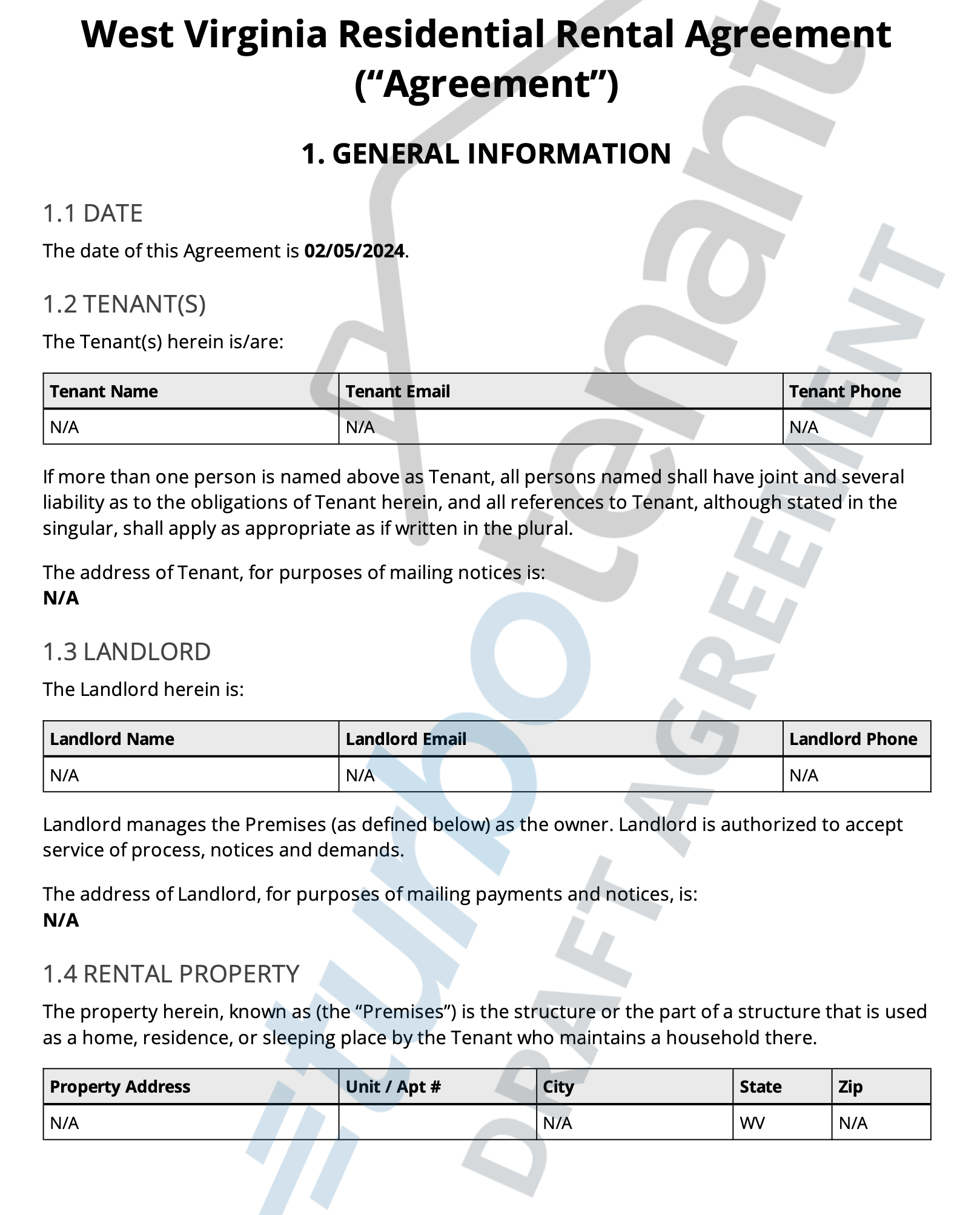
When drafting a lease agreement in West Virginia, it’s essential to include terms that comply with state laws and address the specifics of the rental property. TurboTenant’s Lease Agreement Generator and Templates offer an easy-to-use platform for landlords to create customized and legally compliant documents for their rental properties in West Virginia.
Section 1 – Custom to You
This section of the lease agreement allows landlords to personalize the document with details specific to their rental situation. This customization ensures that the lease clearly outlines the terms agreed upon by both the landlord and tenant.
Personalized Lease Details
- Additional Provisions: Here, landlords can add rules unique to their property, local clauses, or other specifics. It’s recommended to have additional provisions reviewed by a lawyer to ensure compliance.
- Lost Key Policy: Tenants are obligated to return all keys upon moving out. Failure to do so may result in the tenant bearing the cost of rekeying the property.
Section 2 – Specific to West Virginia
This section contains clauses specific to West Virginia’s regulations and laws. These clauses, while editable using our Advanced Editor feature, should be carefully reviewed by an attorney to make sure any changes are legally compliant with state and local laws. Important West Virginia Regulations
- Late Fees (Section 2.1): West Virginia allows landlords to charge a late fee of 5% of the unpaid rent if it is not received by the 5th day of the month.
- Security Deposit Provisions (Section 2.4): While there is no statutory maximum for security deposits in West Virginia, the common practice is 1–2 times the monthly rent. Deposits must be returned within 60 days post-lease termination, or within 45 days if the property is re-occupied.
- Fair Housing (Section 2.11): All parties must comply with federal and West Virginia laws that prohibit discrimination. Landlords should also be aware of any additional local ordinances regarding protected classes.
- Notice of Domestic Abuse Protections (Section 2.17): The lease includes provisions recognizing the rights of tenants who are victims of domestic abuse, sexual assault, or stalking.
Section 3 – General Clauses for Best Practices
These clauses are standard across lease agreements and embody best practices for landlord-tenant relationships.
General Lease Clauses
- Subletting (Section 3.1): Tenants are prohibited from subleasing the property without the landlord’s written consent.
- Altering or Improving the Property (Section 3.2): Tenants must obtain written permission for any alterations or improvements and are expected to return the property in its original condition upon move-out.
- Choice of Law (Section 3.11): The lease agreement is governed by West Virginia laws and includes a consent to use the county courts where the property is located.
- Follow the Law (Section 3.14): Tenants must not violate any laws or ordinances and should not be a nuisance to neighbors.

FAQ
What is the maximum late fee I can charge in West Virginia?
You may charge a late fee of 5% of the total unpaid rent amount if it is not received by the 5th day of the month.
What are the rules for security deposits in West Virginia?
There is no statutory maximum for security deposits in West Virginia; however, it’s standard to charge 1–2 times the monthly rent. The deposit must be returned within 60 days of lease termination, or within 45 days if the property becomes re-occupied by another tenant.
How should I handle additional clauses or rules specific to my property?
Landlords can add additional provisions in the lease for property-specific rules or requirements. It’s recommended to consult with a lawyer to ensure these provisions comply with West Virginia laws.
Are there specific disclosures related to domestic abuse protections in West Virginia?
Yes, tenants in West Virginia have certain protections if they are victims of domestic abuse, sexual assault, or stalking. The lease agreement should include these protections, and landlords should be aware of how these situations affect the lease terms.
TurboTenant West Virginia Lease Agreements
TurboTenant facilitates the creation of comprehensive lease agreements tailored to the unique laws and requirements of West Virginia. By using TurboTenant’s tools, landlords can confidently craft lease agreements that are both legally sound and ensure a clear understanding of the rental terms for both parties. Always remember, for any custom clauses or unique situations, it’s important to seek legal advice to maintain compliance with West Virginia’s rental laws.
West Virginia Resources


